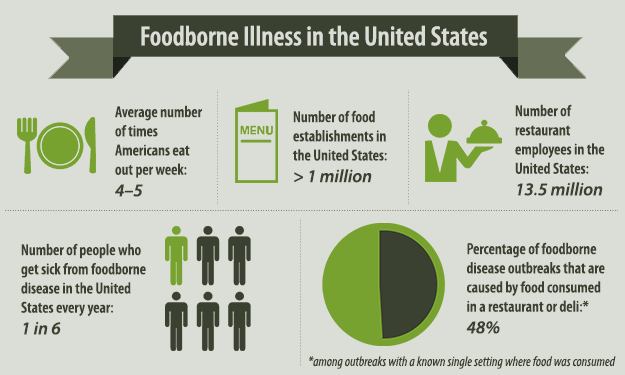
What comes to your mind when you hear the words “foodborne illness” or “food poisoning?” You may think of safety recalls in the news affecting foods like meat or vegetables, or maybe you think of that time you became sick after eating at a restaurant. Whatever your thoughts on food poisoning, it’s likely you’ve had it at some point – the CDC estimates that each year, 1 in 6 Americans will suffer from a foodborne illness. That’s 48 million people a year!
Foodborne illnesses are caused by factors like bacteria, viruses, chemicals, or toxins contaminating the food or drink that we consume. The contamination can happen at any point along the food production process or even after we bring the food products home, if we don’t handle or prepare them correctly. There are over 250 different kinds of illnesses that have been identified. Common symptoms are nausea, cramping, and stomach issues like diarrhea.
Earlier this month, the FDA took steps to try to reduce the amount of foodborne illness that we experience each year by creating the Food Safety Modernization Act. This was meant to improve on current safety standards and will hopefully positively impact the number of recalls and sicknesses that we see on an annual basis.
The top 5 pathogens responsible for foodborne illness in the U.S:
| # of cases annually | Symptoms | Duration | |
| Norovirus – leading cause of stomach flu | Between 19-21 million | Nausea, vomiting, stomach pain, headache, fever, diarrhea | 1-3 days |
| Campylobacter | 1.3 million | Cramping, nausea, diarrhea, fever, vomiting, headache | 1 week |
| Salmonella | 1.2 million | Fever, cramping, diarrhea | 3-7 days |
| Clostridium perfringens – “the 24-hour bug” | 1 million | Cramps, diarrhea, nausea | 1 day or less |
| Staphylococcus aureus | Unknown | Diarrhea, nausea, vomiting, cramps | 1-3 days |
Foodborne Illness Treatment
Treatment for all of the above foodborne illnesses is typically just increasing fluid intake and resting. In some cases, if the patient is immunocompromised or for other specific reasons, antibiotics or other treatment options may be prescribed. While foodborne sickness typically resolves itself naturally, in some cases it can be more severe or even fatal. If you are suffering from symptoms of a foodborne illness that seem severe, come see us at Urgent Care so we can make sure you’re taking the right steps to resolve your sickness.
Lastly, though there may not be a way to fully eliminate your exposure to foodborne illness, there are a few things you can do to minimize your risk:
-
- Wash your hands frequently
-
- Wash raw fruits and vegetables properly before consuming or serving
-
- Clean cutting boards and knives if you’re handling raw meats or foods before using on another type of food
-
- Refrigerate leftover foods soon after cooking and avoid leaving them out on the counter
-
- Cook meat and eggs thoroughly and don’t consume undercooked or raw food products
-
- Avoid exposure to known infected individuals and disinfect any shared surfaces
- Avoid unpasteurized milk
